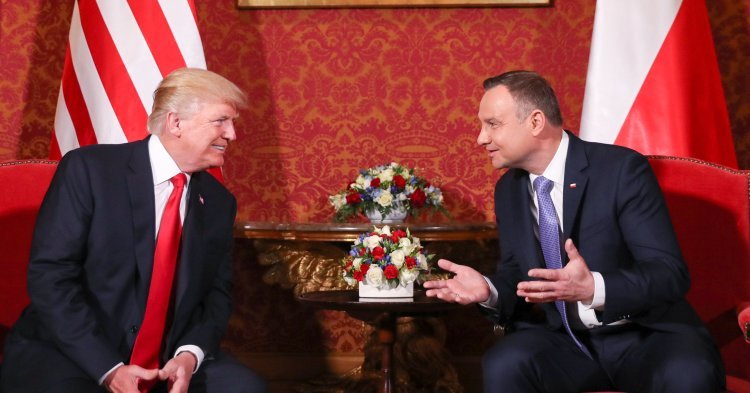The narrative in Poland has not changed. This year, like five years ago, the country’s leadership was decided in a second round of voting. Just like in the previous election of 2015, a mere 400,000 votes allowed Eurosceptic Andrzej Duda, leader of the Law and Justice Party (PiS), to prevail in the presidential elections over his opponent in the Civic Platform Party (PO). In 2015 Duda won against the former President Bronisław Komorowski, and this year he triumphed against the mayor of Warsaw, Rafał Trzaskowski. Duda’s success has been considered a setback for pro-Europeans also due to the fact that the Visegrád Group (a club known for their critical stance against the Union and whose members include Hungary, the Czech Republic and Slovakia) has re-elected the Polish President to chair the group until June 2021.
But first, let’s explore the background of Andrzej Duda. The 48-year-old politician and former lawyer has had a strong relationship with Catholicism since an early age. Inside the PiS, he rapidly moved up the ranks; he held the role of Secretary of State under President Lech Kaczynski for two years. He was then chosen as a candidate at the European elections, which led him to being elected as MEP. He worked as an MEP for over a year and, in 2015, he left his seat to run as candidate for the Polish presidential elections.
Duda’s speedy rise to power was aided by his support for certain battles, in particular, his demands to retain the Polish Currency (złoty) rather than adopting the euro, a battle which characterised his first presidential campaign. Another of the President’s core objectives is defending traditional family values. Duda opposes abortion - despite Poland’s abortion laws being among the strictest in the world (only permissible in cases of rape, incest, if the mothers’ life is at risk, or if the foetus is showing signs of severe disability). He also opposes sex education being taught in schools, supporting a bill that would penalize the promotion of sex among teenagers. What’s more, Duda is convinced that homosexuality is nothing but an ideology which, in his words, is more dangerous than communism.
The biggest threat towards the Rule of Law in Poland is the ongoing reform of the judiciary. In 2019, a decision was taken by the Polish Parliament which would have forced judges to undergo investigations, proceedings, and disciplinary sanctions based on the content of their judicial decisions. As a result, the European Commission launched an infringement procedure against Poland, however the PiS did not back down easily. In fact, in January 2020, the Polish Parliament, along with Duda’s party, approved yet another measure affecting judges, allowing them to be fined, demoted or even fired by the Ministry of Justice if considered critical towards the freely elected majority. Moreover, judges are neither free to criticise the choices of their colleagues, nor can they be politically active.
Whether due to the fact that, after Brexit, Poland became the fifth largest State in terms of population within the European Union and now holds 52 representatives within the European Parliament, or whether it’s due to the fact that it is the wealthiest economy in Eastern Europe, Duda’s re-election and the subsequential support of the Polish people towards the policies put in place by PiS, has reignited the sovereigntist fire within the aforementioned Visegrád Group. In addition, one of the first politicians to congratulate Duda on his re-election was the Hungarian leader Victor Orbán, who defined the friendship between the two States as an engine of Central European cooperation and a dominant factor in European politics.
The special relationship between both leaders is evident; at the last European Council, they both opposed the plan proposed by the European Commission, asking for greater balance in the distribution of aid. Moreover, they have both implemented laws aimed at weakening the LGBT+ community. In Hungary for example, a law was introduced banning transgender people from registering gender reassignment. Infringement procedures against both countries have been initiated by the European Commission for violating Rule of Law. Meanwhile, in the Czech Republic, the party under the leadership of Prime Minister Andrej Babus holds the most populist name in the world: ‘Action of Dissatisfied Citizens’, and in Slovakia, the head of government, Igor Matovič, elected in February this year, put an end to eight years of social democracy and declared that his party would from the best government in Slovakian history.
However, little support has come from other Eastern European states, despite some strongly populist presence within those countries. Romania, unlike Orban’s Hungary, continues to favour the pro-European and liberal path and has no intention of backing Visegrád, especially due to their slight tensions with Hungary. Even on the very day Duda was re-elected as President, Croatia and Bulgaria officially began the process of joining the euro. The Baltic countries on the other hand, have shown themselves to be extremely detached and independent in these matters.
Over the past five years, Duda has built strong alliances across the pond. Donald Trump has never questioned his friendship with Duda, whom he regards as one of his closest allies in Europe. In fact, Trump wants to move some of the American troops withdrawn from Germany to Poland, in a location that the Polish President would like to name Fort Trump. To consolidate their relationship would be the Three Seas Initiative launched by the Eastern bloc in 2015, which has caught Trump’s attention. The aim would be to exploit the Baltic Sea, the Black Sea and the Adriatic Sea for energy purposes; putting a definite end to the Russian-Chinese influence which is of great US concern.
This trust and power confided in Poland could translate into little geopolitical power. The European Union is undergoing one of the most important moments in its history. The Conference on the Future of Europe, where we are expecting to see some proposals of radical change, has been confirmed for the end of September. The overall trust of European citizens in European institutions is, according to polls, extremely high following the pandemic. At this point in time, Europe could seriously begin to consider a future without Poland. Some have claimed that the conflict between Warsaw and the Union has reached a point of no return, which could lead to a Polexit, or rather, a Polgoodbye, where Brussels could be the one to suspend or even expel Poland from the Union for its lack of respect for European treaties and values.
How would Duda react? Most likely, not very well. Yes, he’s a sovereigntist, but not comparable to Boris Johnson – he’s more of a a Matteo Salvini. When Duda talks about Polexit, he mutters it under his breath. He wants to hold the reins of the Union and he knows that with the support of his Club (the Visegrád), this wouldn’t be impossible. However, a forced departure from the Union would be a game changer for Duda, Poland, and the entire Visegrád Group too. Fortunately for Visegrád, nothing is certain at the moment, however one simple irreparable mistake from any of their members in Eastern Europe could be waiting just behind the corner.



Follow the comments: |
|
